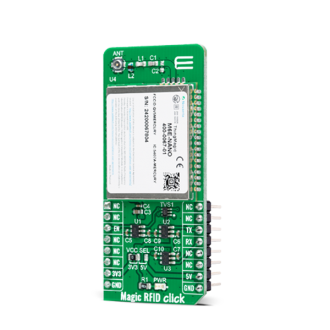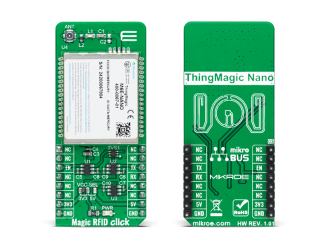
We strongly encourage users to use Package manager for sharing their code on Libstock website, because it boosts your efficiency and leaves the end user with no room for error. [more info]

Rating:
Author: MIKROE
Last Updated: 2021-01-28
Package Version: 1.0.0.0
mikroSDK Library: 1.0.0.0
Category: RFID/NFC
Downloaded: 3387 times
Not followed.
License: MIT license
Magic RFID Click is a compact add-on board that contains an embedded RFID module. This board features the M6E-NANO, UHF RFID module with ultra-low power consumption from JADAK.
Do you want to subscribe in order to receive notifications regarding "Magic RFID Click" changes.
Do you want to unsubscribe in order to stop receiving notifications regarding "Magic RFID Click" changes.
Do you want to report abuse regarding "Magic RFID Click".


Library Description
The library contains basic functions for working with ThingMagic clicks. The user has the ability to read tags and rssi values.
Key functions:
int8_t thingmagic_get_tag_rssi ( void ) - Get Tag RSSI valuevoid thingmagic_tag_parser ( thingmagic_data_t *data_obj ) - Gets Tag value after parsingvoid thingmagic_process ( uint8_t rsp_data ) - General collecting response functionExamples description
The application is composed of three sections :
void application_task ( )
{
if ( thingmagic_get_data_status( ) == 1 )
{
thingmagic_tag_parser( &tag );
mikrobus_logWrite( ">> TAG INFO: ", _LOG_TEXT );
for( cnt = 0; cnt < 12; cnt++ )
{
ByteToHex( tag.tag_buf[ cnt ], demo_text );
mikrobus_logWrite( " 0x", _LOG_TEXT );
mikrobus_logWrite( demo_text, _LOG_TEXT );
}
mikrobus_logWrite( " ", _LOG_LINE );
mikrobus_logWrite( ">> TAG RSSI: ", _LOG_TEXT );
IntToStr( tag.tag_rssi, demo_text );
mikrobus_logWrite( demo_text, _LOG_LINE );
thingmagic_reset_data( );
}
}
Other mikroE Libraries used in the example:
Additional notes and informations
Depending on the development board you are using, you may need USB UART click, USB UART 2 click or RS232 click to connect to your PC, for development systems with no UART to USB interface available on the board. The terminal available in all MikroElektronika compilers, or any other terminal application of your choice, can be used to read the message.